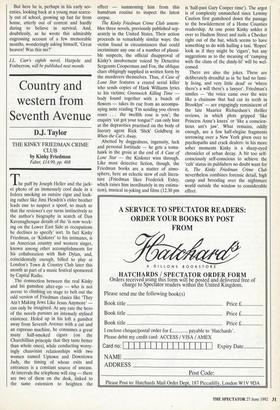Country and western from Seventh Avenue
D.J. Taylor
THE KINKY FRIEDMAN CRIME CLUB by Kinky Friedman
Faber, f14.99, pp. 468
The puff by Joseph Heller and the jack- et photo of an immensely cool dude in a fedora smoking an outsize cigar and look ing rather like Jimi Hendrix's elder brother leads one to suspect a spoof, so much so that the reviewer's eye turns instinctively to the author's biography in search of Dan Kavanaghesque details of the 'is now work- ing on the Lower East Side at occupations he declines to specify' sort. In fact Kinky Friedman, or `Kinkster' to his intimates, is an American country and western singer, known among other accomplishments for his collaboration with Bob Dylan, and, coincidentally enough, billed to play at London's Town & Country Club later this month as part of a music festival sponsored by Capital Radio.
The connection between the real Kinky and his gumshoe alter-ego — who is not averse to climbing on stage to belt out the odd version of Friedman clasics like 'They Ain't Making Jews Like Jesus Anymore' can only be imagined. At any rate the hero of the novels pursues an intensely stylised existence. Holed up in his loft a gunshot away from Seventh Avenue with a cat and an espresso machine, he consumes a great many half-smoked cigars (on the Churchillian principle that they taste better than whole ones), while conducting worry- ingly chauvinist relationships with two women named Uptown and Downtown Judy, the timing of whose exits and entrances is a constant source of unease. At intervals the telephone will ring — there are two of them on the desk, linked to the same extension to heighten the
effect — summoning him from this humdrum routine to inspect the latest corpse.
The Kinky Friedman Crime Club assem- bles three novels, previously published sep- arately in the United States. Their action proceeds in remarkably similar ways: the victim found in circumstances that could incriminate any one of a number of plausi- ble suspects, the official disapproval of Kinky's involvement voiced by Detective Sergeants Cooperman and Fox, the oblique clues obligingly supplied in written form by the murderers themselves. Thus, A Case of Lone Star features a crazed serial killer who sends copies of Hank Williams lyrics to his victims; Greenwich Killing Time body found together with a bunch of flowers — takes its cue from an accompa- nying note reading 'I'm sending you eleven roses . . . the twelfth rose is you'; the enquiry 'cat got your tongue?' can only hint at the depravities practised on the body of literary agent Rick 'Slick' Goldberg in When the Cat's Away.
Abetted by doggedness, ingenuity, luck and personal fortitude — he gets a toma- hawk in the groin at the end of A Case of Lone Star — the Kinkster wins through. Like most detective fiction, though, the Friedman books are a matter of atmo- sphere, here an eclectic stew of cult litera- ture (Friedman likes Frederick Exley, which raises him inordinately in my estima- t. on), musical in-joking and films (12.30 pm
is 'half-past Gary Cooper time'). The argot is of complexity unmatched since Lemmy Caution first gumshoed down the passage to the bewilderment of a Home Counties readership. At one point Kinky ankles it over to Hudson Street and nails a Checker right out of the bat, which seems to have something to do with hailing a taxi. 'Ropes' look as if they might be 'cigars', but any suggestions as to the meaning of 'camping with the clans of the dimly-lit' will be wel- comed.
There are also the jokes. These are deliberately dreadful as in 'he had no fami- ly living, and very little dead' or 'where there's a will there's a lawyer'. Friedman's similes — 'the voice came over the wire like a chainsaw that had cut its teeth in Brooklyn' — are engagingly reminiscent of the late Maurice Richardson's thriller reviews, in which plots gripped 'like Princess Anne's knees' or 'like a conscien- tious ant's jaw'. What remains, oddly enough, are a few half-elegiac fragments sorrowing over a New York given over to psychopaths and crack dealers: in his more sober moments Kinky is a sharp-eyed chronicler of urban decay. A bit too self- consciously self-conscious to achieve the `cult' status its publishers no doubt want for it, The Kinky Friedman Crime Club nevertheless combines forensic detail, high camp and brooding over the nightmare world outside the window to considerable effect.


















































 Previous page
Previous page